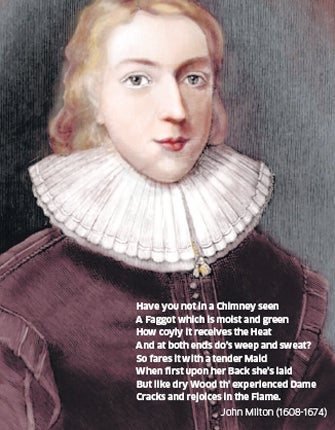Poetry regained: lost Milton work turns up in Oxford archives

Paradise Lost it most definitely is not.
Academics at Oxford University have discovered what appears to be a bawdy poem by John Milton while sifting through their archives.
The work, a coarse innuendo-laden ditty titled "An Extempore Upon A Faggot", was found in the university's Harding Collection, the world's largest collection of popular poetic anthologies and songbooks.
The handwritten poem appears to have been signed by Milton but is written in a style utterly unlike his own, and does not tally with his status as an epic poet, polemicist and scholarly man of letters.
Milton was known for his abandonment of rhyme, irregular rhythms and a dignity and stateliness in his diction. His poems tended to centre on religious allusions, the political nature of the times – he served as a civil servant under Oliver Cromwell's government – and the biblical downfall of man, most notably in his epic poem Paradise Lost.
But the new work, which was discovered by Dr Jennifer Batt, a lecturer in English literature at the university, employs a childishly simple and earthy rhythm of rhyming couplets.
"To see the name of John Milton, the great religious and political polemicist, attached to such a bawdy epigram, is extremely surprising to say the least," Dr Batt said.
"The poem is so out of tune with the rest of his work, that if the attribution is correct, it would prompt a major revision of our ideas about Milton. It is likely that Milton's name was used as an attribution to bring scandal upon the poet, perhaps by a jealous contemporary."
The most likely person to have carried out this deed is Sir John Suckling, a cavalier poet from the same era who was likely to have disliked Milton intensely for his republican beliefs, Dr Batt added.
Dr Abigail Williams, who is leading a group compiling the Digital Miscellanies Index, intended to allow online access to the world's largest collection of popular poetic anthologies, argued that the "style" of the poem suggested that Milton might be the author. But she added: "I don't know that we will ever know who really wrote it – it was a long time ago."
The poem came to light as Dr Batt trawled through the Harding Collection, which is owned by Oxford University's Bodleian Library. It had been read before, but nobody had noticed that Milton's name had been scrawled at the bottom.
The Harding Collection is named after Walter Harding, an impoverished British rag-time musician who amassed a huge collection of printed poems and song books from the 18th and 19th centuries while he was living in Chicago, as they reminded him of his English upbringing. After he died, the books were found crammed inside his apartment.
If the poem is declared to be a work of Milton's, he would join a long list of literary figures whose work has been discovered posthumously. Last year an unfinished murder mystery by Graham Greene was serialised by the Los Angeles Times, although critics panned it as a "far cry" from his later works.
A new version of Mary Shelley's horror story Frankenstein was also published last year, 158 years after her death. The text was in its original form before it was edited by her husband, the poet Percy Bysshe Shelley.
Have you not in a Chimney seen
A Faggot which is moist and green
How coyly it receives the Heat
And at both ends do's weep and sweat?
So fares it with a tender Maid
When first upon her Back she's laid
But like dry Wood th' experienced Dame
Cracks and rejoices in the Flame.
John Milton (1608-1674)
Subscribe to Independent Premium to bookmark this article
Want to bookmark your favourite articles and stories to read or reference later? Start your Independent Premium subscription today.

Join our commenting forum
Join thought-provoking conversations, follow other Independent readers and see their replies